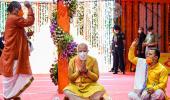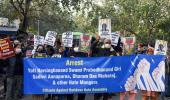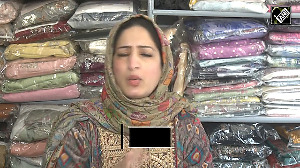'The way discrimination against Muslims has become almost normalised is very upsetting.'

As India celebrates 75 years of Independence, one motor vehicle has become the symbol of new India, and that is the bulldozer.
Bulldozers are indiscriminately being used to 'bulldoze' the lives and livelihood of many poor citizens today, and they happen to be from the minority community.
In the India that celebrates 75 years of Independence, a word that was proudly used by the leaders soon after the nation gained freedom from British rule, has become anathema to today's rulers and it is secularism.
As India celebrates 75 years of Independence, the emotion that is being used effectively by the political class to win votes is, hatred.
Ajay Verghese, assistant professor of political science, Middlebury College in Vermont, USA, whose area of expertise include Indian politics, ethnicity, political violence, historical legacies, religion, and methodology, analyses today's India in this e-mail interview with Rediff.com's Shobha Warrier.
Part one of a two-part interview:
One of the major changes that has happened in Indian society ever since the BJP came to power, is the alienation of minorities especially the Muslims.
As a person who has done research on Hindu-Muslim conflict in India, do you think we have reached a stage where there is indeed a conflict between the majority community and the Muslims now?
I would definitely say yes, although 'conflict' gives the impression that both sides are equal in this fight. As only roughly 15% of the population, Muslims are at a great disadvantage against the supermajority Hindu community.
Although there are instances of riots beginning with Muslims, overwhelmingly they don't, and this is why scholars like Paul Brass and others have used the term 'pogroms' as a better descriptor for religious violence in India.
Can we dig the roots of Hindu-Muslim conflict in India to the divide and rule policy of the British, or was it there even earlier?
My view has always been that this conflict was there even earlier, and I'm currently working on a project with Roberto Foa (external link) that locates the origins of Hindu-Muslim violence in the Mughal-Maratha wars of the late 17th century. The location of those battles correlates pretty strongly with where riots occur today.
There are many scholars who argue that religious conflict predates the British, such as David Lorenzen, Marc Gaborieau, and others.
But I think reasonable minds can disagree, and many scholars have also focused on the impact of the British period, on things like the supposed 'divide and rule' policy.
I don't think this is a settled historical question, but my view is that it is too simple to say that Hindu-Muslim conflict is merely a legacy of the British.
We see that social conflict with the Muslims, and Islamophobia are not confined to India alone. For example, it was one of the major issues in the recent French elections.
Do you think Islamophobia is the major reason behind the rise of right-wing political parties all over the world?
I don't think it's the major reason, but it's definitely one reason.
It's interesting that many of the populist authoritarians like Modi or Trump here in the United States, for example, instituted discriminatory policies towards Muslims.
One of the core features of populism is needling the 'other' -- a group that is threatening, and Muslims have often been that group around the world, especially after the 9/11 attacks.
But the rise of populist authoritarianism probably has more to do with democratic dysfunction and economic factors than Islamophobia.

From that perspective, do you think the rise and rise of the BJP also could be because of the fear and hatred some Hindus harbour towards Muslims?
There are lots of different reasons why the BJP has been successful.
Some scholars point to Modi's focus on development schemes.
Others point to the party's success in expanding the base, winning over new SC/ST voters.
Yet others point out that the implosion of the Congress party, and its lack of a charismatic leader, has aided the dominance of the BJP.
Remember that the Congress won seven of the first eight general elections in India, and so from that standpoint, the rise of an alternative was long overdue.
It's likely a mix of all of these factors.
I have done >surveys with Hindu voters in Bihar and few professed, either in the survey or to me personally, hatred toward Muslims. But there are definitely some voters to whom the fear of Muslims is a vote getter.
Some say the Congress's Muslim appeasement policy -- rather the party using Muslims as a vote bank -- is the reason behind the conflict and the rise of the BJP. Do you agree?
It's true that the Congress' commitment to secularism has been historically inconsistent, to say the least.
But I don't think 'Muslim appeasement' is really the issue, that's mainly a catchphrase from BJP politicians. In fact, I think catchphrases like appeasement are often just a way to distract focus from elements of the BJP's economic agenda that have stalled.
Why didn't the party focus much more on development in 2019? I think because their record was quite uneven, and they didn't want to run on that.
Hate politics rules in India now. Would you say, this is one of the worst periods in India's history where Indian society is divided like never before?
I am personally more worried about open, organised, violence against Muslims now than I have been previously.
The way discrimination against Muslims has become almost normalised is very upsetting.
There was a video I saw on Twitter recently of a huge crowd in Sarangpur, MP, that were chanting and brandishing swords in front of a mosque. That is what I mean about normalisation -- the open hostility toward Muslims is really scary.

With the kind of support the BJP enjoys from sections of Hindus, do you think the party will succeed in making India a Hindu Rashtra?
In some ways, the country is already a Hindu Rashtra.
Many Hindus that I surveyed in Bihar seemed to think that Hindus, simply because they form a numerical majority, deserve special treatment, which, of course, goes against the Indian conception of secularism.
So, if the dominant community feels this way, then India is already a Hindu nation.
What scholars like Christophe Jaffrelot and others worry about now is India becoming a Hindu Raj. Jaffrelot points to the declining representation of Muslims in elected assemblies, their political marginalisation, etc.
In that sense it's not just culturally a Hindu nation, but politically becoming one as well.
Feature Presentation: Aslam Hunani/Rediff.com











 © 2025
© 2025